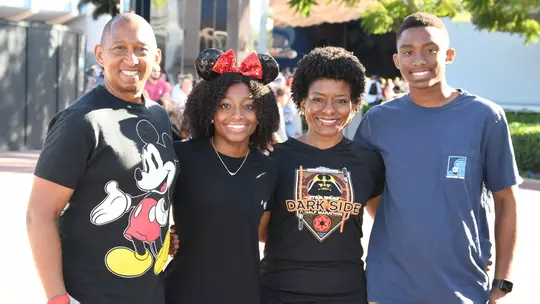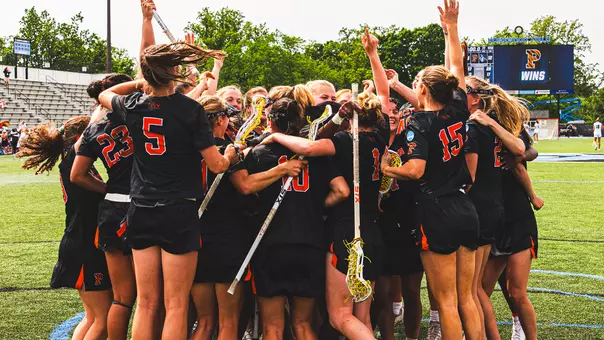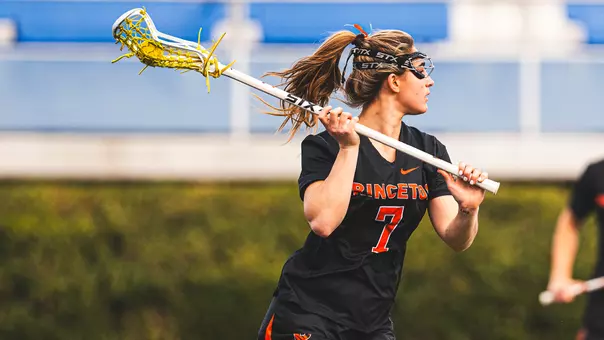Princeton University Athletics
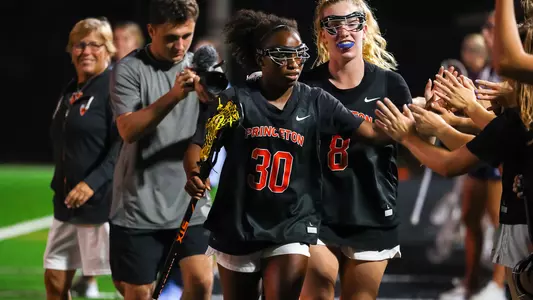
Black History Month Feature: Nina Montes ’25
February 17, 2022 | Women's Lacrosse
Even these days, for all the talk of progress and awareness, Nina Montes remains somewhat unique in the sport of lacrosse. She is currently the only Black player on the Princeton women’s team, just as she was the only Black player on her high school team and the only Black player on her club team.
For all the growth the sport has undergone in recent years, there is clearly still ground to cover on the issue of race. Certainly the headlines in college women’s lacrosse from this past weekend speak to that, what with the allegations of racist comments hurled at the Howard University team.
“I know race is a very important topic right now,” Montes says. “I feel fortunate for never having been put into that kind of situation.”
Then she pauses, as if she’s learned something from the words she herself just spoke.
“Of course,” she says slowly, “I shouldn’t have to consider myself fortunate for not having had to deal with something that nobody should ever have to deal with in the first place.”
“That was really perceptive of her, how she followed up her first response,” says her head coach, Chris Sailer. “She shouldn’t have to consider herself fortunate. I’m glad she hasn’t had those experiences, but she’s entirely right. That should be the norm, and sadly that’s not always the case.”
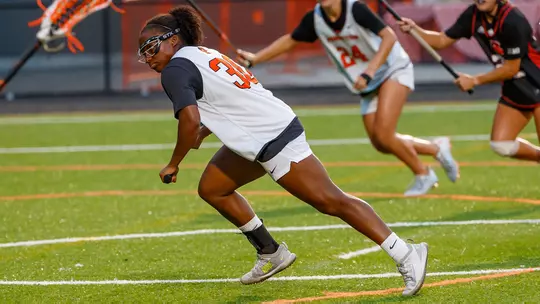
As the 2022 season begins – for the Princeton women, that means a trip to Virginia for a game Sunday at noon – lacrosse is a sport that still wrestles with its past, one that was overwhelming, and at times exclusively, white. Today, there are efforts and initiatives to make the sport more inclusive and at the same time to embrace its Native American roots.
“The game has been far too white for far too long,” Sailer says. “In general, college coaches are more cognizant than ever to diversify the sport and seek out talent wherever we can find it, to give more opportunities to players of color and Native Americans. There are plenty of Black and Native players who can compete at the highest levels of our sport. It’s on us to find them. You’ll be seeing teams that look more diverse, including ours, by the way. It’s a positive move for the game.”
Montes may be Princeton’s only Black player this year, but that is likely to change next year for Sailer’s successor’s first team, as there figure to be three Black players in the incoming class. While instances of outright racist behavior become newsworthy, such as the example of the Howard game last week, they are also rare. What is much more common is racial stereotyping of players in the sport.
The Princeton men, for instance, have featured All-American Black players like Damien Davis and Austin Sims. Both were highly skilled, thoughtful players – Davis in particular is one of the most cerebral players Princeton has ever had – and yet the word that was used to describe both of them more than any other word was “athletic.”
If anyone can speak to the grassroots efforts that are underway, it’s Sailer, a member of the Board of Harlem Lacrosse, one of the inner-city lacrosse organizations that are providing early opportunities for young kids to play. For its part, Harlem Lacrosse has spread now to five cities: New York, Philadelphia, Boston, Baltimore and Los Angeles. As role models, the Princeton women have made many trips to meet with the young players, who also benefit from an emphasis on education within the program. The message is that there are doors that can be opened by combining school and lacrosse, doors that the earliest generation of players to benefit from the program are only now going through. They will be followed by many others.
“These kinds of changes are long overdue,” Sailer says. “There has been a national reckoning. And that means Princeton women’s lacrosse as well. Coaches are realizing that it has to start with us, that we have to make changes. In the past, more of the Black players in women’s lacrosse would play defensive positions. Black players have the same ability to have skill as white players. It’s not showing evolved thinking to pigeonhole Black players to playing defense.”
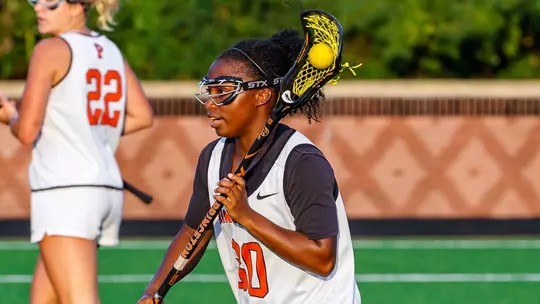
Montes is not a defensive player. She is an offensive player, one who came to Princeton as a middie but has been moved to attack.
There is hardly a sport out there that she has not played. The list she rattles off is a long one: gymnastics, soccer, baseball, basketball, track, basketball, floor hockey and flag football. She’s also an avid skier who is a fan of the more extreme sports.
“I love the adventure,” she says. “I’ve surfed. I’ve hiked. I love to snowboard. I’ll snowboard off a cliff, but not for the next four years. I don’t want to risk getting hurt for lacrosse.”
She grew up in the South Loop section of Chicago, close enough to Soldier Field to be able to walk there from her house.
“I’m a Bears fan,” she says. “Sadly. I loved growing up in the city. We were a train ride away from anything you could want. Our parents made sure we had a great combination of freedom and security."
She and her twin brother Paul were introduced to lacrosse somewhat randomly.
“My brother hated just about every sport,” she says. “We were going on a family bike ride in the suburbs of Chicago and passed the New Trier boys’ lacrosse team as it was having a scrimmage. My brother stopped in his tracks and almost caused a pile up on the bike path. We all pulled over and spent the rest of the afternoon watching the team play lacrosse. That night, Paul asked my parents if he could play. My mom immediately researched teams in the area and found Chicago Youth Lacrosse, a local beginner’s team. She signed him up, and I decided to play as well.”
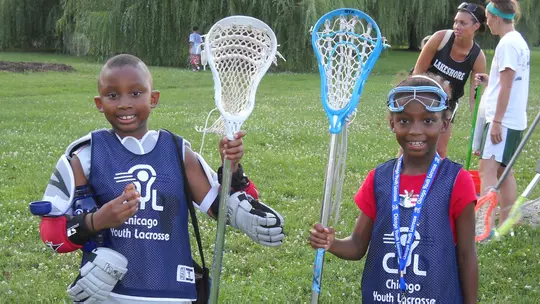
Paul now attends Brown and plays on the club team. Nina, all 5-2 of her, would put together a great career at St. Ignatius High, earning U.S. Lacrosse All-American honors last year as a senior. She was also the Illinois High School Player of the Year and a three-time all-state selection who finished her career with 160 goals and 71 assists out of the midfield, despite having her junior year of 2020 wiped out by the pandemic. She also played on the Lakeshore club team, traveling throughout the country to find the best events and competition.
She first made her way onto Sailer’s radar at, of all places, UCLA, where Sailer was coaching at a showcase event. Montes also went to camps and prospect days at Princeton.
“My first time on the campus was in February of 2018,” she says. “I came for a winter clinic, and I took one of those campus tours. I kept thinking ‘this could be my home.’”
When Princeton did become her home this past fall, she had no idea what to expect lacrosse-wise.
“I walked in with absolutely no expectations,” she says. “I was just happy to be a part of the team. We just want to have fun and hope to give Chris a great last season. As for me, I still don’t have any expectations.”
Maybe not, but she has made quite an impression. She has been moved from midfield to crease attack, and she’s had to learn the complexities of the new position while adjusting to the speed and pace of the college game. Despite that, she figures to be in the starting lineup when her rookie season begins.
“She’s really come on in the last few weeks,” Sailer says. “We’ve been saying ‘we have to get this kid on the field.’ She has been learning a new position and a new system and seeing how she can be most effective, but she has incredible potential.”
“I’ve always liked the attacking side more the defensive side, so this is very exciting for me,” Montes says. “It helps a lot to have Kyla [Sears] there. She’s the best attacking mentor you could possibly have. She’s so poised. She has a presence. She makes everyone else on the field free really secure, more in control.”
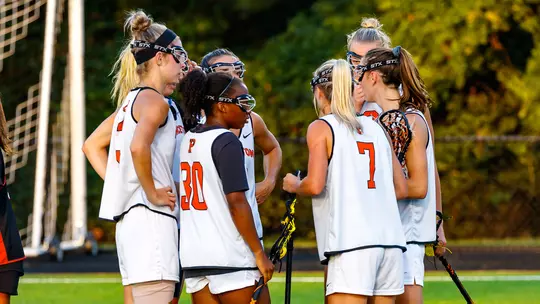
When she does start a game and does score a goal, she’ll become the first Black player at Princeton to do either since Amanda Leavell in 2016. Whether or not she sees the significance, or considers it significant, it is there.
“I’ve never thought about it, really,” she says. “I was just with my friends, playing a sport I love. This is what I get to do in my free time. I never looked at what I was representing.”
Again, when she continues her thought, it takes her in a slightly different direction.
“I never want someone to feel their race should hold them back in something they want to do,” she says. “If I can be a role model for someone who sees me and thinks “hey, maybe I can play lacrosse too,’ then that would be a great thing."
She can definitely play lacrosse. It doesn't take much lacrosse knowledge to realize that as you watch her play. She simply stands out on the field.
Perhaps the world isn't quite ready to realize that her skin color has nothing to do with why that is and that the way she plays the game has everything to do with why that is, but it appears to getting closer. It's the Nina Montes' of the lacrosse world who will get the sport there.
— by Jerry Price
